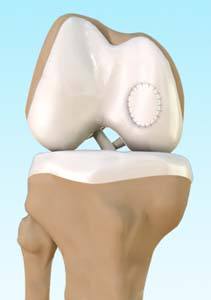
What is Autologous Chondrocyte Implantation?
Autologous chondrocyte implantation (ACI) is a procedure to treat the articular cartilage defects of the knee. This procedure is effective for treating small areas of cartilage damage that causes pain and swelling and restricts range of motion. Autologous chondrocyte implantation is not indicated if you have advanced arthritis of the knee.
Autologous Chondrocyte Implantation Procedure
Autologous chondrocyte implantation is a two-stage procedure.
The first step is performed arthroscopically to evaluate the cartilage defect. If the defect is appropriate for an ACI procedure, the healthy cartilage cells are harvested from the non-weight-bearing area of the bone. The healthy cartilage cells are then sent to the laboratory where the cells are cultured and multiplied over a 3- to 5-week period. Once enough cells have grown, the second procedure called arthrotomy or an open procedure is performed.
In the second procedure, a large incision is made to expose the area of cartilage damage. A second incision is then made over the shinbone and a “patch” is harvested from the periosteum, a thick tissue that covers the shinbone. This periosteal patch that is harvested is cut appropriately to match the size of the cartilage defect. The patch is then sewn over the cartilage defect and the cultured cells are injected underneath the periosteal patch, which holds the new cartilage cells around the cartilage defect.
Postoperative Care following Autologous Chondrocyte Implantation
Following the ACI procedure, you will not be allowed to bear weight for at least 6-8 weeks so that the cells adhere to the underlying bone. You may still observe limited range of motion for a certain period.
Complications of Autologous Chondrocyte Implantation
One of the most common complications of ACI is periosteal hypertrophy which occurs due to scar tissue formation around the edges of the periosteal patch. Other complications such as implant failure, knee infection and knee stiffness may also occur.
Advantages of Autologous Chondrocyte Implantation
The advantage of the ACI procedure is that the cartilage cells are taken from your own body; hence, there is a reduced risk of the graft being rejected by your body.
The disadvantage is that it is a two-step procedure and requires an open incision.
Related Topics
- Knee Arthroscopy
- ACL Reconstruction
- Knee Cartilage Restoration
- Meniscal Surgery
- Patellofemoral Knee Replacement
- Meniscus Replacement
- Cartilage Replacement
- PCL Reconstruction
- Knee Ligament Reconstruction
- Posterolateral Corner (PLC) Reconstruction
- Revision Knee Ligament Reconstruction
- Posterolateral Corner Reconstruction
- LCL Reconstruction
- MCL Reconstruction
- LPFL Reconstruction
- Medial Patellofemoral Ligament Reconstruction
- Quadriceps Tendon Repair
- Knee Fracture Surgery
- Meniscectomy
- Distal Realignment Procedures
- Partial Arthroscopic Meniscectomy
- Patellofemoral Realignment
- Failed Anterior Cruciate Ligament (ACL) Reconstruction
- Failed Meniscus Repair
- Lateral Lengthening
- Meniscal Transplantation
- Prior Meniscectomy
- Tibial Eminence Fracture
- ORIF of the Knee Fracture
- Bone-Patellar Tendon-Bone (BPTB) Autograft
- Bone-Patellar Tendon-Bone (BPTB) Allograft
- Hamstring Autograft
- Hamstring Allograft
- Knee Osteotomy
- High Tibial Osteotomy
- Tibial Tubercle Osteotomy
- Distal Femoral Osteotomy
- Multiligament Reconstruction of the Knee
- Patellar Tendon Repair
- Arthroscopic Reconstruction of the Knee for Ligament Injuries
- Autologous Chondrocyte Implantation
- Partial Meniscectomy
- Cartilage Microfracture
- Pharmacological Interventions for Knee Injuries
- Ultrasound-Guided Genicular Nerve Block
- Intraarticluar Knee Injection
- Viscosupplementation
- Physical Therapy for Knee








